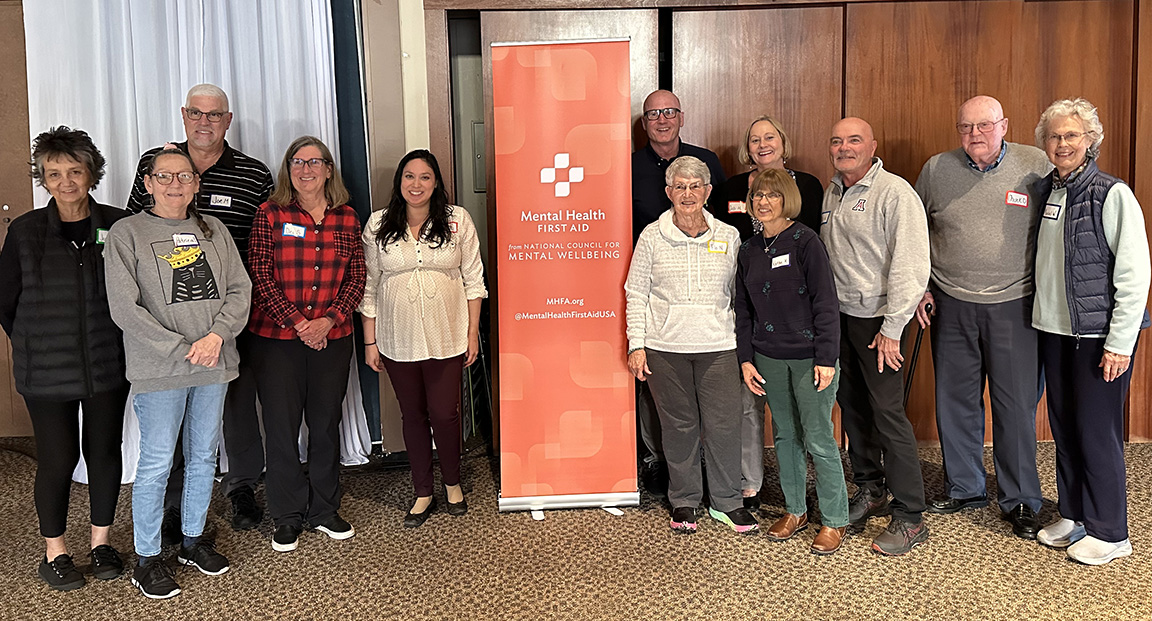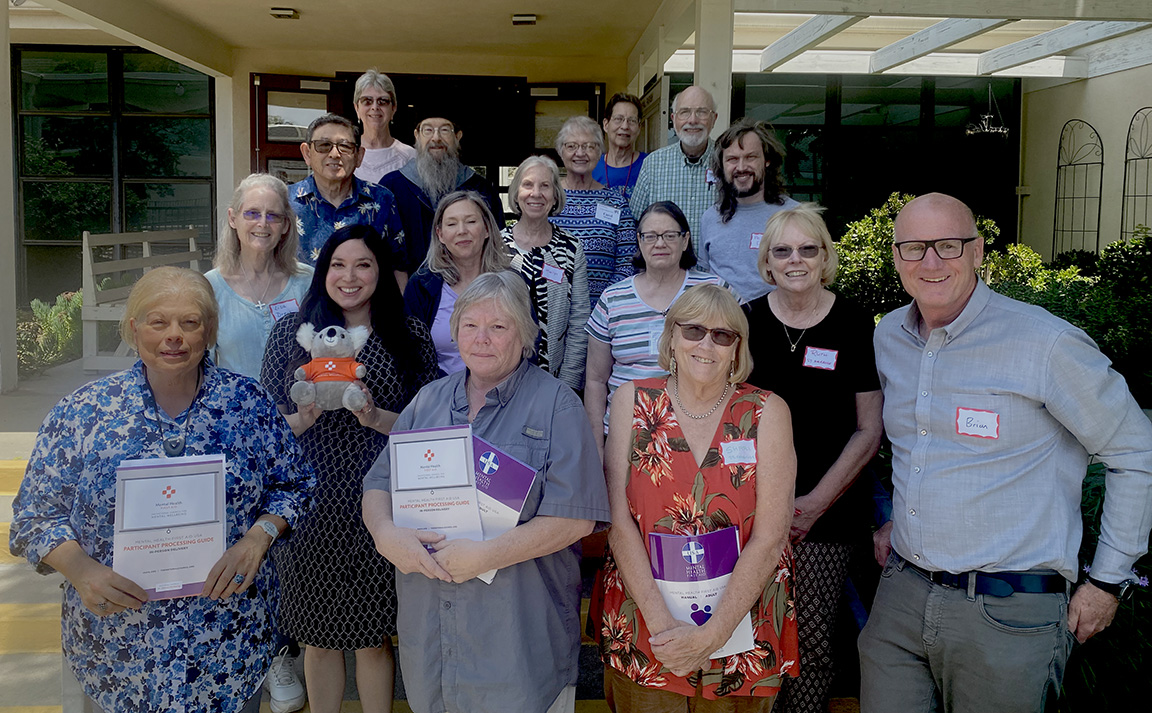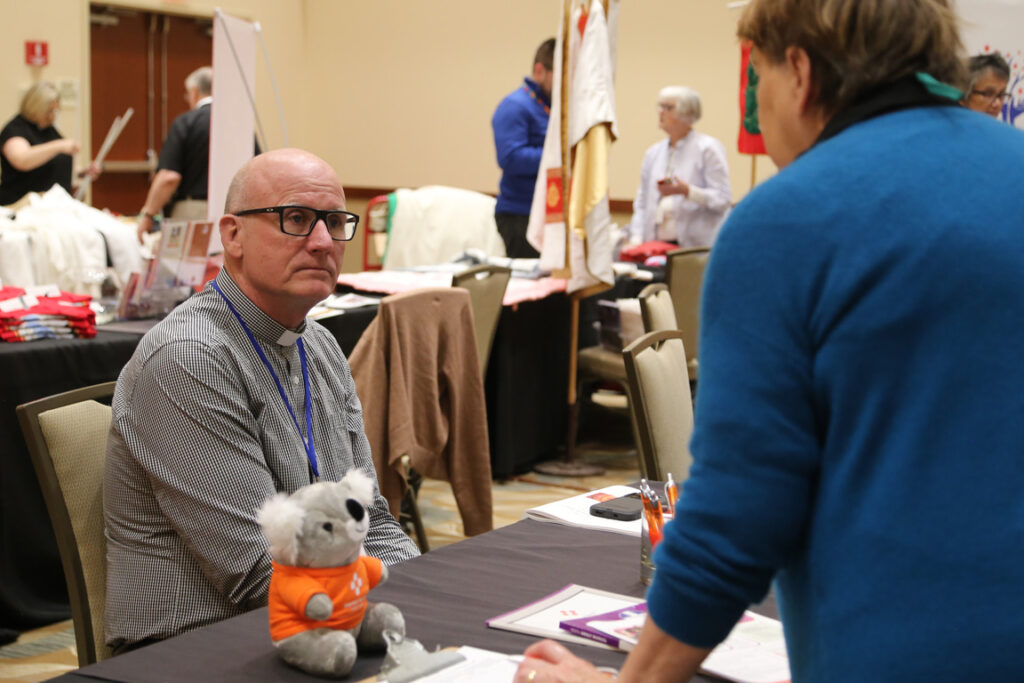
Brian Tucker, center back, taught a MHFA course Feb. 24 at St. George’s Church, Laguna Hills, that drew attendees from several congregations. Photo: Courtesy of Brian Tucker
[The Episcopal News] Just as CPR courses teach how to help someone experiencing a heart attack, Mental Health First Aid (MHFA) training equips members of diocesan congregations to assist those facing mental health challenges.
Those challenges now affect a growing number of people in the United States – about one in five, according to the Rev. Brian Tucker.
“We all have these times when we are struggling,” said Tucker, the diocesan MHFA trainer and a former hospital chaplain who serves at Prince of Peace Episcopal Church in Woodland Hills.
Especially since the pandemic, he says, “collectively, communities are experiencing a mental health crisis … which can be everything from situational anxiety to a full-on mental illness diagnosis in any given year. And in a lifetime, the number goes to about half.”
Unfortunately, unlike heart attacks or physical ailments, mental illness is still stigmatized, “but it’s just part of life,” Tucker added. “Mental Health First Aid just makes us better equipped to be good neighbors and to meet people where they are.”
The training also offers participants a toolbox of strategies for use with family, friends, and co-workers “that you can use in your everyday life to support those around you,” says Sarah Tucker, a therapist who team teaches the course along with her father-in-law.
MHFA was developed in Australia in 2001 by Betty Kitchener, a nurse specializing in health education, and Tony Jorm, a mental health literacy professor. It is administered in the United States by the National Council for Mental Wellbeing, a nonprofit advocacy group representing more than 3,400 member organizations, which seeks mental wellbeing – including from substance abuse – as “a reality for everyone, everywhere,” according to the organization’s website.
More than 30 million people in the United States are without access to affordable mental health treatment and substance abuse, the website says.
The daylong course teaches how to recognize common signs and symptoms of mental illness and substance abuse; how to interact with a person in crisis; how to connect that person to localized care; and also self-care. A five-step action plan is known by the acronym ALGEE, for:
- Approach and assess for risk of suicide or harm, and assist;
- Listen nonjudgmentally;
- Give reassurance and information;
- Encourage appropriate professional help;
- Encourage self-help and other support strategies.
Tucker also suggested use of the 988 dialing code (similar to 911) that connects callers to the 988 Suicide & Crisis Lifeline (formerly known as the National Suicide Prevention Lifeline), “where support from trained crisis counselors is available 24/7 nationwide for anyone experiencing a mental health or substance use crisis or any other emotional distress,” according to the website of Vibrant Emotional Health and the Substance Abuse and Mental Health Services Administration (SAMHSA), which administers the program.
Suggested donation for the course is $20 to cover materials costs.
“Maybe a third of the day is getting facts and information, correcting any misinformation about mental health disorders or challenges,” Sarah Tucker said. “Another third is the how-tos of the tangible skills you can use in a crisis when you’re trying to support others. And then the other third is practice, talking about exactly what you’re going to say, and saying it out loud in different scenarios.”
“It taught me how to notice when someone may be struggling with a mental health issue and gave appropriate ways to respond,” said Sister Patricia Terry of the Anamchara Fellowship, who attended a MHFA training class in Maryland. “We all tend to be more comfortable with helping people with a physical illness.
“The training goes a long way to placing mental health first aid on the same footing as physical first aid,” said Terry, who chairs the Bishop’s Commission on Gospel Justice and Community Care, which has promoted the MHFA course. “If someone was bleeding, wouldn’t we help them obtain medical assistance? It should be the same with mental health. Our nonjudgmental support can give people hope that things will get better.”

Members and friends of St. Mark’s Church, Upland, completed the MHFA training in May 2023. Photo: Keith Yamamoto
Providing initial care, defusing fear
After an unexpected visitor showed up one Sunday morning at St. Mark’s Church in Upland, “talking to himself and moving around in a very animated manner” and upsetting parishioners, Carol Morgan scheduled a MHFA training.
The visitor “came into our church narthex and was very animated, very excited, saying he went to our preschool many years before this and was very excited to see it again,” recalled Morgan, who chairs the newcomer committee and holds a master’s degree in social work.
“Some people were extremely concerned about him being present and did not feel safe with him there,” Morgan said. “Personally, I was upset at the church members because he was not doing anything that was threatening to anybody. I also have multiple family members who suffer from different mental health challenges, so I thought it wasn’t a problem.
“I decided to sit with him during our church service to make him feel comfortable and also during coffee hour,” she said. “He left soon after he saw what he wanted to see – his old preschool.”
However, she said, concerns continued among parishioners.
“When I saw there was this class, I thought maybe this would help some of our people. I especially thought of having ushers and greeters attend the class.”
Churches are often on the frontline of mental health pastoral care, said the Rev. Rand Reasoner, rector of Tucker’s congregation, Prince of Peace.
“People either come to us from outside our congregations or come to us from within our congregations and they’re suffering from a wide variety and breadth of mental health challenges,” he said. “The better prepared we are as clergy and laity to identify – not necessarily diagnose, but to identify – what we think might be going on and pastorally assist people to get the help they need, the better. And often that help is right here in the congregation.”
Prince of Peace’s West Valley Food Pantry feeds about 80,000 people yearly, and church volunteers and staff frequently encounter guests who are facing multiple challenges, he said.
“People come and they’re stressed. They’re hurting and most of these folks are not our parishioners,” Reasoner said. With the training, “compassion starts to build, and we start to have a heart for pastoral care, mercy, empathy around other people’s situations – and it makes the world a better place.”

Brian Tucker answers questions at the MHFA booth at the November 2023 meeting of Diocesan Convention. Photo: Janet Kawamoto
After spending three hours in a morning session, “hearing about coming alongside and listening and caring and not being quite as afraid of someone with mental health challenges,” attendees at a Prince of Peace-hosted MHTA session 18 months ago had an “immediate hands-on opportunity” to practice what they’d learned when someone showed up in crisis, he recalled.
“People were milling around outside, and there was an unhoused person having a full psychotic break. Maybe this is an extreme example of what we face, dealing with mental health issues, but it was interesting to see the number of people who came alongside him, asked his name, and did some of the things that personalize people having a mental health crisis.”
The training isn’t just to equip parishioners for in-church episodes, but also for those outside the congregation, he added. “So much of what we see of mental health challenges today – what so many folks are experiencing – comes from loneliness, from pain that hasn’t been dealt with and is unresolved and from people trying to use various substances to mask it. The loneliness and isolation that so many of us have experienced, not only during the pandemic, which certainly multiplied it, but just in the everyday life of people having difficulties making connections because people are so busy or whatever.
“It can be helpful to address issues I believe the church really should be addressing anyway and is probably the best-equipped institution to do so.”
Chuck Day, a parishioner at St. George’s Church in Laguna Hills, who leads a weekly conversation called “Talk of Ages” that includes “the joys and challenges of maturing,” said a recent training at his congregation has helped his lay pastoral ministry.
“There are some unique problems dealing with older people and I thought taking the course might help,” he said. “There is also an individual I am calling on who has been having some challenges and I wanted to understand it a bit better.
“It’s very valuable for leadership in the church to take this course,” he added. “There is a lot of mental illness that does not get taken care of because it is not recognized, and people are not able to discuss it with others.”
Deb Hartman, a St. George’s parishioner, thought the course was excellent. She took it along with her husband Bill because “we both thought it would help us understand and possibly help people dealing with the increasing challenges of our lives.
“Despite its full-day length, there was even more we could have learned and discussed. Mental health is a complicated and challenging subject. The presenters were well-versed on the subject and personable. They were effective teachers. And they were empathetic. We both feel we are more conscious of the pervasiveness of mental health crises and feel better equipped to talk to people about the subject.”
Sometimes the ones who need help aren’t immediately obvious. Tucker recalled meeting with a couple who had been on vacation when the husband experienced a horrible accident. “They were airlifted to a hospital in a different state, spent time in that hospital, and he made a remarkable, nearly immediate full recovery and really didn’t have any memory of the event. He is fine. But his spouse, who witnessed this accident, was left completely traumatized,” Tucker said.
“The congregation naturally gravitates to and comes around the victim. And we all did so. We were all saying, ‘Wow, what a miraculous thing that you recovered.’ Yet, the spouse was literally trembling, saying, ‘Hey, you need to come and talk to me.'”
Church leaders interested in scheduling MHFA training are invited to contact the Rev. Brian Tucker at brian.tucker@outlook.com.
